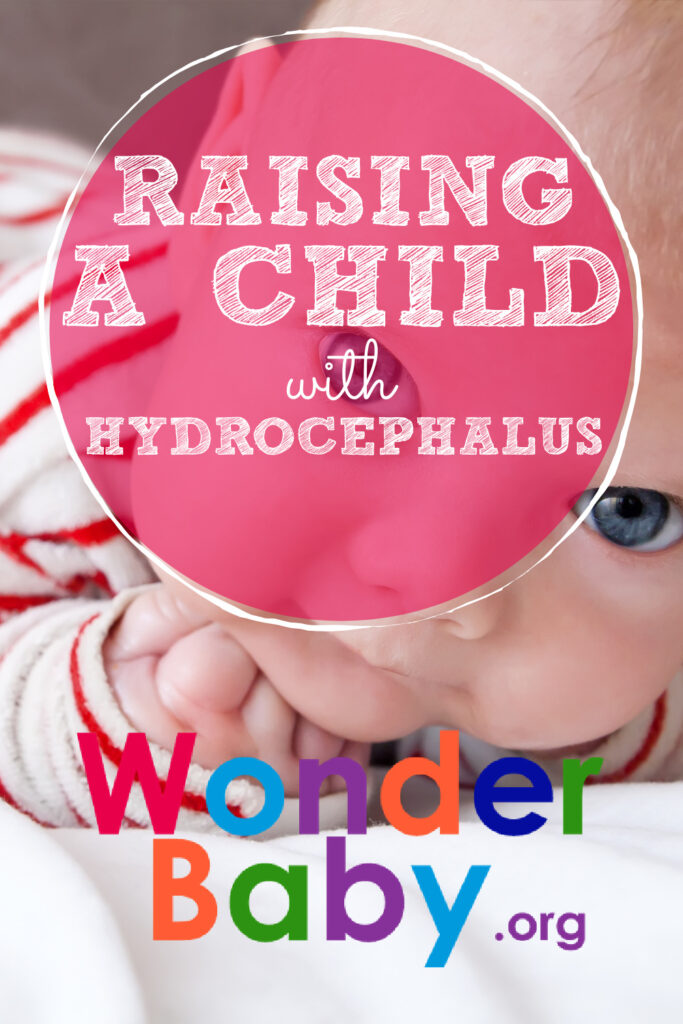Raising a Child With Hydrocephalus

- Hydrocephalus is not a disease itself but instead a symptom of another problem.
- Hydrocephalus causes cerebral spinal fluid to build up around the brain and spinal cord.
- A child with a hydrocephalus diagnosis may need surgery or placement of a shunt.
- Children with either congenital hydrocephalus or acquired hydrocephalus can lead healthy lives if they are treated early.
Raising a child with hydrocephalus can be a challenging adjustment for any parent. If left untreated, the build-up of cerebrospinal fluid (CSF) can build up very quickly and become life-threatening. If a child with hydrocephalus is recognized and treated early, though, the most severe complications of hydrocephalus can be prevented.
Raising a child with hydrocephalus can be challenging, but there are support groups and resources available to make it easier.
Hydrocephalus in Children: What Parents Should Know

Cerebral spinal fluid is essential for transporting nutrients, cushioning the brain, and carrying waste away from the brain. However, too much cerebral spinal fluid in the skull causes pressure on the brain and can prevent enough blood and oxygen from reaching the brain tissue.
The Hydrocephalus Association11. What is Hydrocephalus?. Hydrocephalus Association. https://www.hydroassoc.org/about-hydrocephalus explains that hydrocephalus occurs when the body makes more cerebral spinal fluid than the brain can absorb. It may be present before birth, develop shortly after birth, or be caused by injury or illness.
How To Tell if a Child Has Hydrocephalus
Symptoms of hydrocephalus can vary from mild to severe. Some symptoms may appear immediately at birth, and others may develop more slowly as swelling in the brain increases.
The experts from the Mayo Clinic22. Mayo Foundation for Medical Education and Research. Hydrocephalus. Mayo Clinic. 2023. https://www.mayoclinic.org/diseases-conditions/hydrocephalus/symptoms-causes/syc-20373604 state that symptoms of pediatric hydrocephalus from birth to 1 year include:
- Bulging of the fontanelle (the soft diamond-shaped spot on the top of the head)
- Irritability
- Difficulty feeding
- Poor growth
- Rapid growth of the head or an unusually large head
- Seizures
- Sleepiness
- Vomiting
Symptoms of hydrocephalus in toddlers and older children include:
- Abnormal enlargement of the head
- Vision problems
- Personality changes
- Decline in school performance
- Delayed milestones
- Loss in acquired skill ability
- Difficulty waking up or staying awake
- Headaches
- Irritability
- Nausea or vomiting
- Poor appetite
- Lack of coordination
- Seizures
- Loss of balance
Hydrocephalus can be diagnosed by several different methods. Your doctor may first notice signs of hydrocephalus during a pregnancy ultrasound. Hydrocephalus doesn’t often develop until the third trimester.
After birth, your child’s doctor may notice signs and symptoms of hydrocephalus in your child and may recommend testing to determine if hydrocephalus is the cause.
Ultrasound
An ultrasound uses sound waves to create an image of the inside of the body. Ultrasounds can be used during pregnancy to show the size of the ventricles of the brain inside the baby’s head. An ultrasound can also be used after birth to determine hydrocephalus if the anterior fontanelle (soft spot on the baby’s head) remains open. It usually closes between 7-18 months old.
MRI
An MRI uses large magnets and radio waves to show a detailed image of organs and structures inside the body. It uses an extremely strong magnet to get a view of all parts of the brain. MRI scanning is not safe for children who have some implantable medical devices.
CT Scan
A CT scan uses X-rays and computer technology to show detailed images of the bones, muscles, fat, and organs. CT scans are more detailed than X-rays but less detailed than MRIs. Occasionally, a physician will order a CT scan with contrast dye to get a better picture of the structures of your child’s body. Some children may have an allergic reaction to the contrast.
Blood Work
Blood tests may be used to look for specific proteins that could indicate that your baby may be at risk for hydrocephalus.
Hydrocephalus can be diagnosed before your baby is born, shortly after, or throughout childhood. If hydrocephalus is suspected, your doctor will first take a history and perform a physical exam.
Neurological Exam
Your doctor will perform a neurological exam on your child to assess their brain function. Your doctor will check your child’s reflexes, muscle strength and tone, sense of touch, vision, and eye movements. If your child is older, your doctor will also check your child’s hearing, mental status, and mood.
How Does Hydrocephalus Affect a Child?

Experts at Johns Hopkins Medicine33. Hydrocephalus in Children. Johns Hopkins Medicine. 2021. https://www.hopkinsmedicine.org/health/conditions-and-diseases/hydrocephalus/hydrocephalus-in-children state that hydrocephalus is the most common reason for brain surgery in children. Some children with hydrocephalus can recover with no physical or cognitive complications after treatment. Other children, however, may suffer permanent brain damage.
Developmental Milestones
Whether or not a child with hydrocephalus will meet their normal developmental milestones depends on the severity of the child’s condition and if they have any other exacerbating conditions like cerebral palsy or spina bifida.
Most children with hydrocephalus will have a delay in their gross motor skills and fine motor skills.
Behavior
Many children with hydrocephalus are able to respond appropriately to social interaction and function well at school. However, some children with severe hydrocephalus may have difficulty developing skills like emotional regulation or social integration.
Behavior problems like irritability and forgetfulness are common for children with increased pressure on their brains. Although all children will present with different symptoms, worsening behavior problems may be an indication to seek medical care.
How Do You Care for a Child With Hydrocephalus?

Knowing the signs, symptoms, and causes is a good place for parents to start. But parents have to know exactly how to care for their child with hydrocephalus and the treatment options that are available to them.
Medical Treatment
The most common treatment for a child’s hydrocephalus is the surgical placement of a shunt. A shunt44. Shunt Procedure. Johns Hopkins Medicine. 2021. https://www.hopkinsmedicine.org/neurology-neurosurgery/specialty-areas/cerebral-fluid/shunts is a small tube placed inside one of your child’s ventricles that drains cerebral spinal fluid into a different chamber of the body such as the heart or stomach.
While shunt placement is generally relatively safe and effective, parents must be aware of the signs of shunt malfunction. Shunt failure may cause a child to have new or worsening symptoms of hydrocephalus, like vision changes, irritability, confusion, seizures, slurred speech, or headache.
Another less common treatment option is called a ventriculostomy. During this surgery, the surgeon will create a hole in the brain to allow cerebral spinal fluid to drain from the skull.
Similar to any other surgery, the most common complications of these treatments are bleeding and infection. Your child’s medical team will keep your child in the hospital for several days after surgery to monitor for any complications, and to make sure that the shunt or ventriculostomy is working properly.
Social Support
Being the parent of a child with special needs is not an easy task. Wherever you can, seek the support of families and friends, and find supportive doctors who are available to answer questions about your child’s care as they come up.
In addition, make sure you communicate well with your child’s teachers and help them gain the knowledge they need about your child’s diagnosis. You can work with your school’s leaders to create an individualized education plan that addresses difficulties your child may face and help them work on skills that are appropriate for your child’s age and condition.
Families of children with hydrocephalus understand the difficulties, fear, and emotional turmoil that other parents may not understand. Seeking support from families who share your experience may be helpful.
Shine Charities has many programs, information sheets, and resources available for parents of children with hydrocephalus and spina bifida.
Tips on Raising a Child With Hydrocephalus

Caring for a child with hydrocephalus can be challenging. However, your child’s future can be filled with joy and love, despite the challenges they may face.
Keep the following in mind throughout your child’s life:
- Accept that they may be different from other children.
- Show your child unconditional love.
- Give your child plenty of opportunities to develop their social skills.
- Keep your doctors informed of any changes in your child’s condition.
- Connect with other families who are raising children with hydrocephalus.
- Be aware of the signs and symptoms of shunt malfunction55. Shunt Malfunction Signs. Cincinnati Childrens. 2023. https://www.cincinnatichildrens.org/health/s/shunt-malfunction or worsening fluid buildup in the brain.
FAQs
Is hydrocephalus a form of autism?
Hydrocephalus is not a form of autism, but they sometimes occur together. According to recent studies66. Munch, T. N., Hedley, P. L., Hagen, C. M., Bækvad-Hansen, M., Bybjerg-Grauholm, J., Grove, J., Nordentoft, M., Børglum, A. D., Mortensen, P. B., Werge, T. M., Melbye, M., Hougaard, D. M., & Christiansen, M.. Co-occurring hydrocephalus in autism spectrum disorder: a Danish population-based cohort study. Journal of Neurodevelopmental Disorders. 2021;13(1). https://doi.org/10.1186/s11689-021-09367-0, the connection between hydrocephalus and autism is not clear.
What is the life expectancy of children with hydrocephalus?
According to the experts at UCLA Health77. Hydrocephalus FAQs. UCLA Health. https://www.uclahealth.org/medical-services/pediatric-neurosurgery/conditions-treatment/pediatric-hydrocephalus-program/hydrocephalus-faqs, children with hydrocephalus who receive prompt treatment have a normal life expectancy.
References
- What is Hydrocephalus? Hydrocephalus Association. (n.d.). https://www.hydroassoc.org/about-hydrocephalus
- Mayo Foundation for Medical Education and Research. (2023, September 15). Hydrocephalus. Mayo Clinic. https://www.mayoclinic.org/diseases-conditions/hydrocephalus/symptoms-causes/syc-20373604
- Hydrocephalus in Children. Johns Hopkins Medicine. (2021, August 8). https://www.hopkinsmedicine.org/health/conditions-and-diseases/hydrocephalus/hydrocephalus-in-children
- Shunt Procedure. Johns Hopkins Medicine. (n.d.). https://www.hopkinsmedicine.org/neurology-neurosurgery/specialty-areas/cerebral-fluid/shunts
- Shunt Malfunction Signs. Cincinnati Childrens. (2023, June). https://www.cincinnatichildrens.org/health/s/shunt-malfunction
- Munch, T. N., Hedley, P. L., Hagen, C. M., Bækvad-Hansen, M., Bybjerg-Grauholm, J., Grove, J., Nordentoft, M., Børglum, A. D., Mortensen, P. B., Werge, T. M., Melbye, M., Hougaard, D. M., & Christiansen, M. (2021). Co-occurring hydrocephalus in autism spectrum disorder: a Danish population-based cohort study. Journal of Neurodevelopmental Disorders, 13(1). https://doi.org/10.1186/s11689-021-09367-0
- Hydrocephalus FAQs. UCLA Health. (n.d.). https://www.uclahealth.org/medical-services/pediatric-neurosurgery/conditions-treatment/pediatric-hydrocephalus-program/hydrocephalus-faqs

The information WonderBaby provides is not intended to be, and does not constitute, medical or other health advice or diagnosis and should not be used as such. Always consult with a qualified medical professional about your specific circumstances.
Related Posts

Health & Nutrition
Can Baby Skin Care Products Expire?
Is that forgotten tube of diaper rash cream still safe to use? Learn more about the expiration dates of popular skin care products for infants.

Health & Nutrition
Boosting Immunity in Kids: 3 Tips for a Healthy Winter
Parents can help boost their kids’ immunity during cold and flu season by maintaining healthy eating, sleeping, and exercising habits in the winter.

Health & Nutrition
Flat Head Syndrome and Torticollis: What You Should Know
Torticollis, or tight muscles in the neck, may cause your baby to have a flat spot on their head that needs to be assessed and treated by a physician.